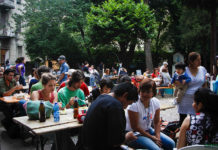An educational group on sexuality and affectivity for psychiatric patients
Vaccaro A.(Psychiatrist, Psychotherapist), Zoppellaro C. (Psychologist, Psychotherapist)
Introduction
Within an Italian Residential Facility adopting psycho-educational methodologies with the aim to promote how the patient can increase their degrees of autonomy, independence and freedom, we have recently introduced a rehabilitation group whose focus is sexual and social affectivity education. There are many good reasons to deal with the sexuality of psychiatric patients. Many of them have sexual activity that, if not educated, leads them to risk of contagious diseases. Sexual dysfunctions caused or facilitated by pharmacological therapy leads in many cases not to take it properly. Educating patients with chronic disease on the ability to maintain intimate relationships, and encouraging them to engage in sexual relations can help them out of social isolation, a risk factor for relapse. A response to the enhancement of sexual problems is psychoeducation, which does not mean only stimulate a gradual consciousness of somatic and physiological characteristics of the two sexes, or responsible use of contraception, but especially extend this consciousness to the psycho-social aspects that sexuality involves.
|
Aims Helping patients to become familiar with the issues and the language of sexuality (using correct terminology, clear and shared); exchanging points of view on expectations, fears and doubts about the sexual life; gaining an awareness of nature and universality of sexuality; gaining an understanding of the various aspects (biological, psychological and social) of sexuality. Following this way it is crucial to raise awareness on various aspects of the sexuality: relational and communicative, biological and procreative, emotional-affective, socio-cultural (stereotypes, prejudices), recreational and pleasant; of the male and female differences (physical, mental, emotional), as well as individual differences: attributed meanings, feelings and personal emotions. Finally, the group aims to increase knowledge and awareness of contraception and prevention of sexually transmitted diseases. |

Results
A first round of meetings carried out saw the active participation of ten patients who were offered a questionnaire of knowledge of the topics covered and sexual habits (in terms of contraception, perception of risk, etc.), incoming and output.


|
Methods We used an educational approach aimed at enhancing the comparison of opinions in an atmosphere of mutual respect. The main technique was active teaching, such as activations, simulations, role playing. In an effective communication management, we tried to enhance active listening and assertive communication skills. The program is divided into three modules that the operator can redefine and adapt to the specific needs of the group. A serious and thorough analysis of the application, with an analysis of the strengths and weaknesses of patient‘s knowledge, it has allowed the experts (psychiatrist and psychotherapist) to organize the work properly. |
Conclusions
The qualitative analysis of questionnaire’s results showed an improvement not only in knowledge based on the topics discussed, but also in the changes of problematic behaviors. The sample, however, is still limited to make comprehensive statistics analysis.
Bibliography
Azzoni A., Raja M “Un questionario sulla sessualità nei pazienti psichiatrici. Presentazione della versione revisionata”, Rivista di psichiatria (2004), 39, 5, pp. 309-314.
Dr. Ascanio G. Vaccaro a.vaccaro@psicopoli.com














